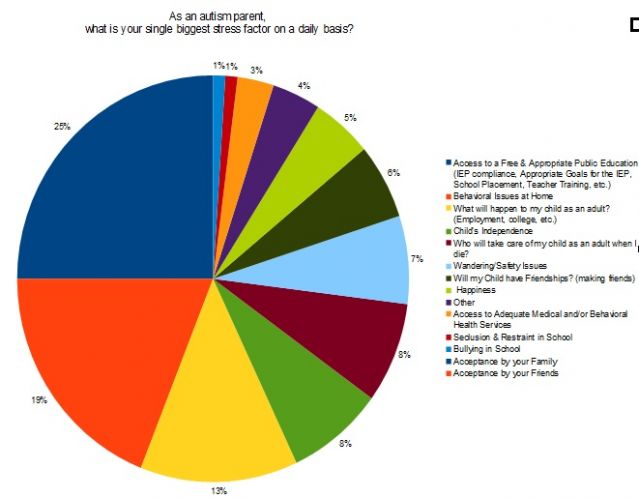

Autism parents are as different as the autistic children we raise; likewise, so are our life stressors. For me, my biggest stressor des not come from autism; it comes from the constant struggle to get and maintain services. My son doesn’t wander; so while we don’t worry about that issue, we still do worry about him safely crossing a street or accidently offending someone, which he’d never do on purpose. Since the day of the diagnosis, I’ve worried about what will happen to my son after I die, doing my best to prepare him for his life as an adult.
From insurance companies to school districts, parents often face insurmountable obstacles trying to help their autistic children. Many times, we think we have everything in place, then another shoe drops, and we are left scrambling to fix whatever’s broken. It affects our ability to work and maintain relationships with those friends and family who simply have no idea what our lives are like. And often, in our struggle to get medical, behavioral and/or educational services, it drains our finances.
So it is not a surprise that many parents of children with autism commiserate, trying to find solutions to alleviate the stress and help their children. We join support groups and online listservs seeking comfort and help in finding and accessing resources. Whenever I talk to a parent who has a newly diagnosed child, one of the first things I recommend is finding a local (county, state or school district) parent support group. Local autism support groups can help parents with recommendations for schools, advocates, doctors, social skill groups, therapy, etc. Nationally known groups such as the Autism Society or TACA, often run local support groups and provide parents with seminars and family activities that can be both fun and informative.
What are Autism Parents Saying About Stress?
In a recent polling of 100 autism parents, the number one daily stressor was Access to a Free & Appropriate Public Education (IEP compliance, Appropriate Goals for the IEP, School Placement, Teacher Training, etc.). If your child is under the age of 21, he/she is eligible under federal law to receive FAPE. Even before the state and federal governments started making cuts to education, it was difficult for to get FAPE. With no federal autism teaching competencies and no federal law against seclusion, restraint and aversives, it is literally like a box of chocolates in public education: you never know what you are going to get. And unfortunately, that can be as harmful as someone not following an IEP to the asphyxiation and death of a child from restraint. Sure there are good teachers and programs sprinkled into the mix, but parents generally don't get to choose their child's teacher and excellent autism programs can be difficult to get into.
In my opinion, excellent teachers exist, but there are no federal standards for autism teaching competencies, so it is common to get a teacher who knows very little about autism, positive behavior support and/or teaching children with autism. For example, in the state of Pennsylvania, there are no state mandated teaching competencies for a person who teaches an “Autism Support” classroom. And unfortunately, it doesn’t take very much coursework or experience above regular ed teaching certification to become certified in special education. So it is not unheard of for parents to find out their child’s teacher is certified in special education but truly has little to no experience teaching children with autism.
In addition, when it comes to fighting for FAPE, the burden of proof is often on parents (in some states, not all). So the district has all the student records, experts, and seemingly an endless pot of money to spend on lawyers. School administrators have the power to create a “contest of wills” over small IEP issues that would be of little to no cost to the district. If a parent chooses to fight the district for FAPE, it can personally cost them thousands of dollars to do so, sometimes in the range of twenty to thirty thousand dollars. Even if they win, they do not necessarily recoup costs. So low to moderate income families are certainly at a disadvantage should they need to fight for FAPE. While some parties would seek mediation, a low cost solution, some districts and parents proceed directly to due process, because it is not mandated by law that they go to mediation first.
The point here is that this number one stressor does not have to exist in such a demonstrative fashion. Sure, there will always be disagreements between schools and parents as how to most appropriately teach children. But if we could implement federal autism teaching competencies, we’d go far in making sure teachers who teach our children have the skills and experience they need. And leveling the playing field for disagreements, like putting the burden of proof back on districts, would go a long way towards helping parents exercise their procedural safeguards. In addition, I personally feel that mediation should not be optional. Both parents and districts should meaningfully and fairly participate in this low cost option before spending thousands of dollars on due process.

The second biggest stress factor parents reported was Behavioral Issues at Home. I can personally attest to the fact that when my son was very little, this was a huge concern. He tantrummed often, and honestly, if we hadn’t had the behavioral health supports, I am not sure how my son’s behavior would be today.
It is entirely reasonable how this issue presents a serious and common parental concern given that during the diagnosis, many parents are given a diagnosis but not educated in how to help modify behaviors. Often parents are given a diagnosis, a pat on the head, and sent on our merry way out the office door. From medications to positive behavioral supports to sensory integration, parents are forced to sort out solutions to negative behaviors on their own. Again, I do think that support groups can help parents, but I would caution that there are many expensive and experimental treatments out there that promise to help behavior. And given some of the harsh and inhumane treatments, like seclusion and aversives, being utilized by some practitioners, parents need to be really careful when looking for ways to modify behavior and should try to find a good behavior specialist that they can trust.
The one thing we do know is that positive behavioral support can help to reduce, eliminate and/or replace behavior. Yet this circle brings us back to the ability to access behavioral health services at home. Many insurers pay little to nothing for behavioral health and/or autism services. And while MA does pay for behavioral health, it is not a perfect system nor can all parents get their child qualified for MA.
Looking at Stress Factors

There are many other serious stressors for parents that may not have ranked high in this poll but are arguably the most stressful and important considering they relate to life and death. Wandering is a serious, life endangering activity that some autistic children do. Parents resort to alarms, fences, locks, etc. but unfortunately, some children do wander and end up dead from drowning, being struck by a car, etc. I think it is important that autism organizations and doctors identify this potential issue and educate families and the community how to help. I can personally tell you that not one doctor in all my son’s fifteen years has asked if he wandered. It should be something we at least talk about, so that parents are aware it can happen, how to help prevent it and keep our children safe.
Another serious stress factor, one that I think about daily, is what is going to happen to my child when he is an adult and/or when I die. While I fully expect my son to go to college someday, I am merely hoping for his independence; it is not a certainty. Regardless of the severity a disability, I strongly support inclusion both within school and work communities. But like FAPE, inclusion in colleges and work environments will not come without advocacy.
Also, it important to call out the human services cuts that are affecting our adult populations. It is a disgrace that in an effort to balance budgets, adults with disabilities are losing life saving benefits that allow them to remain active and contributory members of the community in a home setting, as opposed to an institution or living on the street. While those of us with school age children may not see this issue on our radar, it will become more and more of a factor as our wave of children grow into adults.
Final thoughts
Unfortunately, this poll is quite simplistic and cannot possibly measure the true stress parents feel. It’s not scientific, but I can tell you from talking with my own friends and other parents, these concerns are very real and common.
The one thing I would say to younger parents, as an older parent, is to never give up hope. I know more than anyone it can be frustrating, but our kids are capable of so much and are extraordinary. When my son was little he’d often throw himself down on the floor and tantrum, barely able to speak, he couldn’t always tell me what was wrong or how I could help. In fact, up until the end of third grade, he was still eloping out of the classroom. Today, he is fully included a public school, and he’s doing very well; we’re so proud of him. And it isn’t just him; he’s not an anomaly. He has lots of other autistic friends his age who are doing well too.

When it comes to dealing with schools and getting FAPE, please join a local support group. They can be an invaluable resource, helping you sort out what to do in the never-ending FAPE maze. Also, get an advocate early on, so you can make sure your child’s IEP is appropriate from the very beginning, starting in Preschool or Kindergarten. Don’t be afraid of advocating. It is our responsibility as parents to advocate for our children in school, so they can be independent someday.
Lastly, when the going gets tough, try to keep things in perspective, which isn’t always easy. Yes, serious problems like wandering deserve a serious response. But when your child decides to draw all over your new white carpet with green marker (yes, this happened to me), remember that they are kids, maybe a bigger kid, but kids. Sometimes neurotypical kids, like my creative little daughter, get into things, make messes and tantrum too; that is just life. I say this as a parent who came downstairs to silly string all over the family room ceiling and crayon on the walls last week. Was I upset? Sure. End of the world? No. All I can say is that it is a good thing they invented the magic sponge.
Stress should be a powerful driving force, not an obstacle. ~Bill Phillips
~~~~~~~~~~~~~~~~~~~~~~~
*If you’d like to add comments about what stresses you out or how to help parents relieve stress, please do so. I like to keep it positive here, so please don’t judge other parents. From eating issues to behavior to getting FAPE, we all have our stressors and are trying to do what’s best for our families.*



